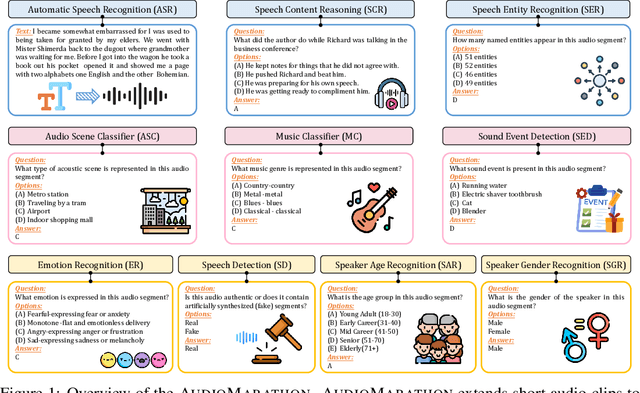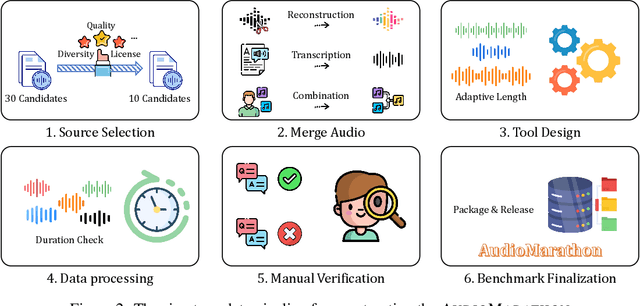Cunxiang Wang
GLM-5: from Vibe Coding to Agentic Engineering
Feb 17, 2026Abstract:We present GLM-5, a next-generation foundation model designed to transition the paradigm of vibe coding to agentic engineering. Building upon the agentic, reasoning, and coding (ARC) capabilities of its predecessor, GLM-5 adopts DSA to significantly reduce training and inference costs while maintaining long-context fidelity. To advance model alignment and autonomy, we implement a new asynchronous reinforcement learning infrastructure that drastically improves post-training efficiency by decoupling generation from training. Furthermore, we propose novel asynchronous agent RL algorithms that further improve RL quality, enabling the model to learn from complex, long-horizon interactions more effectively. Through these innovations, GLM-5 achieves state-of-the-art performance on major open benchmarks. Most critically, GLM-5 demonstrates unprecedented capability in real-world coding tasks, surpassing previous baselines in handling end-to-end software engineering challenges. Code, models, and more information are available at https://github.com/zai-org/GLM-5.
MVSS: A Unified Framework for Multi-View Structured Survey Generation
Jan 14, 2026Abstract:Scientific surveys require not only summarizing large bodies of literature, but also organizing them into clear and coherent conceptual structures. Existing automatic survey generation methods typically focus on linear text generation and struggle to explicitly model hierarchical relations among research topics and structured methodological comparisons, resulting in gaps in structural organization compared to expert-written surveys. We propose MVSS, a multi-view structured survey generation framework that jointly generates and aligns citation-grounded hierarchical trees, structured comparison tables, and survey text. MVSS follows a structure-first paradigm: it first constructs a conceptual tree of the research domain, then generates comparison tables constrained by the tree, and finally uses both as structural constraints for text generation. This enables complementary multi-view representations across structure, comparison, and narrative. We introduce an evaluation framework assessing structural quality, comparative completeness, and citation fidelity. Experiments on 76 computer science topics show MVSS outperforms existing methods in organization and evidence grounding, achieving performance comparable to expert surveys.
Beyond Literal Mapping: Benchmarking and Improving Non-Literal Translation Evaluation
Jan 12, 2026Abstract:Large Language Models (LLMs) have significantly advanced Machine Translation (MT), applying them to linguistically complex domains-such as Social Network Services, literature etc. In these scenarios, translations often require handling non-literal expressions, leading to the inaccuracy of MT metrics. To systematically investigate the reliability of MT metrics, we first curate a meta-evaluation dataset focused on non-literal translations, namely MENT. MENT encompasses four non-literal translation domains and features source sentences paired with translations from diverse MT systems, with 7,530 human-annotated scores on translation quality. Experimental results reveal the inaccuracies of traditional MT metrics and the limitations of LLM-as-a-Judge, particularly the knowledge cutoff and score inconsistency problem. To mitigate these limitations, we propose RATE, a novel agentic translation evaluation framework, centered by a reflective Core Agent that dynamically invokes specialized sub-agents. Experimental results indicate the efficacy of RATE, achieving an improvement of at least 3.2 meta score compared with current metrics. Further experiments demonstrate the robustness of RATE to general-domain MT evaluation. Code and dataset are available at: https://github.com/BITHLP/RATE.
DVD: A Robust Method for Detecting Variant Contamination in Large Language Model Evaluation
Jan 08, 2026Abstract:Evaluating large language models (LLMs) is increasingly confounded by \emph{variant contamination}: the training corpus contains semantically equivalent yet lexically or syntactically altered versions of test items. Unlike verbatim leakage, these paraphrased or structurally transformed variants evade existing detectors based on sampling consistency or perplexity, thereby inflating benchmark scores via memorization rather than genuine reasoning. We formalize this problem and introduce \textbf{DVD} (\textbf{D}etection via \textbf{V}ariance of generation \textbf{D}istribution), a single-sample detector that models the local output distribution induced by temperature sampling. Our key insight is that contaminated items trigger alternation between a \emph{memory-adherence} state and a \emph{perturbation-drift} state, yielding abnormally high variance in the synthetic difficulty of low-probability tokens; uncontaminated items remain in drift with comparatively smooth variance. We construct the first benchmark for variant contamination across two domains Omni-MATH and SuperGPQA by generating and filtering semantically equivalent variants, and simulate contamination via fine-tuning models of different scales and architectures (Qwen2.5 and Llama3.1). Across datasets and models, \textbf{DVD} consistently outperforms perplexity-based, Min-$k$\%++, edit-distance (CDD), and embedding-similarity baselines, while exhibiting strong robustness to hyperparameters. Our results establish variance of the generation distribution as a principled and practical fingerprint for detecting variant contamination in LLM evaluation.
AudioMarathon: A Comprehensive Benchmark for Long-Context Audio Understanding and Efficiency in Audio LLMs
Oct 08, 2025



Abstract:Processing long-form audio is a major challenge for Large Audio Language models (LALMs). These models struggle with the quadratic cost of attention ($O(N^2)$) and with modeling long-range temporal dependencies. Existing audio benchmarks are built mostly from short clips and do not evaluate models in realistic long context settings. To address this gap, we introduce AudioMarathon, a benchmark designed to evaluate both understanding and inference efficiency on long-form audio. AudioMarathon provides a diverse set of tasks built upon three pillars: long-context audio inputs with durations ranging from 90.0 to 300.0 seconds, which correspond to encoded sequences of 2,250 to 7,500 audio tokens, respectively, full domain coverage across speech, sound, and music, and complex reasoning that requires multi-hop inference. We evaluate state-of-the-art LALMs and observe clear performance drops as audio length grows. We also study acceleration techniques and analyze the trade-offs of token pruning and KV cache eviction. The results show large gaps across current LALMs and highlight the need for better temporal reasoning and memory-efficient architectures. We believe AudioMarathon will drive the audio and multimodal research community to develop more advanced audio understanding models capable of solving complex audio tasks.
GLM-4.5: Agentic, Reasoning, and Coding (ARC) Foundation Models
Aug 08, 2025Abstract:We present GLM-4.5, an open-source Mixture-of-Experts (MoE) large language model with 355B total parameters and 32B activated parameters, featuring a hybrid reasoning method that supports both thinking and direct response modes. Through multi-stage training on 23T tokens and comprehensive post-training with expert model iteration and reinforcement learning, GLM-4.5 achieves strong performance across agentic, reasoning, and coding (ARC) tasks, scoring 70.1% on TAU-Bench, 91.0% on AIME 24, and 64.2% on SWE-bench Verified. With much fewer parameters than several competitors, GLM-4.5 ranks 3rd overall among all evaluated models and 2nd on agentic benchmarks. We release both GLM-4.5 (355B parameters) and a compact version, GLM-4.5-Air (106B parameters), to advance research in reasoning and agentic AI systems. Code, models, and more information are available at https://github.com/zai-org/GLM-4.5.
Unlocking Recursive Thinking of LLMs: Alignment via Refinement
Jun 06, 2025Abstract:The OpenAI o1-series models have demonstrated that leveraging long-form Chain of Thought (CoT) can substantially enhance performance. However, the recursive thinking capabilities of Large Language Models (LLMs) remain limited, particularly in the absence of expert-curated data for distillation. In this paper, we propose \textbf{AvR}: \textbf{Alignment via Refinement}, a novel method aimed at unlocking the potential of LLMs for recursive reasoning through long-form CoT. AvR introduces a refinement process that integrates criticism and improvement actions, guided by differentiable learning techniques to optimize \textbf{refinement-aware rewards}. As a result, the synthesized multi-round data can be organized as a long refinement thought, further enabling test-time scaling. Experimental results show that AvR significantly outperforms conventional preference optimization methods. Notably, with only 3k synthetic samples, our method boosts the performance of the LLaMA-3-8B-Instruct model by over 20\% in win rate on AlpacaEval 2.0. Our code is available at Github (https://github.com/Banner-Z/AvR.git).
Exploring the Evolution of Physics Cognition in Video Generation: A Survey
Mar 27, 2025Abstract:Recent advancements in video generation have witnessed significant progress, especially with the rapid advancement of diffusion models. Despite this, their deficiencies in physical cognition have gradually received widespread attention - generated content often violates the fundamental laws of physics, falling into the dilemma of ''visual realism but physical absurdity". Researchers began to increasingly recognize the importance of physical fidelity in video generation and attempted to integrate heuristic physical cognition such as motion representations and physical knowledge into generative systems to simulate real-world dynamic scenarios. Considering the lack of a systematic overview in this field, this survey aims to provide a comprehensive summary of architecture designs and their applications to fill this gap. Specifically, we discuss and organize the evolutionary process of physical cognition in video generation from a cognitive science perspective, while proposing a three-tier taxonomy: 1) basic schema perception for generation, 2) passive cognition of physical knowledge for generation, and 3) active cognition for world simulation, encompassing state-of-the-art methods, classical paradigms, and benchmarks. Subsequently, we emphasize the inherent key challenges in this domain and delineate potential pathways for future research, contributing to advancing the frontiers of discussion in both academia and industry. Through structured review and interdisciplinary analysis, this survey aims to provide directional guidance for developing interpretable, controllable, and physically consistent video generation paradigms, thereby propelling generative models from the stage of ''visual mimicry'' towards a new phase of ''human-like physical comprehension''.
StepMathAgent: A Step-Wise Agent for Evaluating Mathematical Processes through Tree-of-Error
Mar 13, 2025Abstract:Evaluating mathematical capabilities is critical for assessing the overall performance of large language models (LLMs). However, existing evaluation methods often focus solely on final answers, resulting in highly inaccurate and uninterpretable evaluation outcomes, as well as their failure to assess proof or open-ended problems. To address these issues, we propose a novel mathematical process evaluation agent based on Tree-of-Error, called StepMathAgent. This agent incorporates four internal core operations: logical step segmentation, step scoring, score aggregation and error tree generation, along with four external extension modules: difficulty calibration, simplicity evaluation, completeness validation and format assessment. Furthermore, we introduce StepMathBench, a benchmark comprising 1,000 step-divided process evaluation instances, derived from 200 high-quality math problems grouped by problem type, subject category and difficulty level. Experiments on StepMathBench show that our proposed StepMathAgent outperforms all state-of-the-art methods, demonstrating human-aligned evaluation preferences and broad applicability to various scenarios. Our data and code are available at https://github.com/SHU-XUN/StepMathAgent.
LongSafety: Evaluating Long-Context Safety of Large Language Models
Feb 24, 2025



Abstract:As Large Language Models (LLMs) continue to advance in understanding and generating long sequences, new safety concerns have been introduced through the long context. However, the safety of LLMs in long-context tasks remains under-explored, leaving a significant gap in both evaluation and improvement of their safety. To address this, we introduce LongSafety, the first comprehensive benchmark specifically designed to evaluate LLM safety in open-ended long-context tasks. LongSafety encompasses 7 categories of safety issues and 6 user-oriented long-context tasks, with a total of 1,543 test cases, averaging 5,424 words per context. Our evaluation towards 16 representative LLMs reveals significant safety vulnerabilities, with most models achieving safety rates below 55%. Our findings also indicate that strong safety performance in short-context scenarios does not necessarily correlate with safety in long-context tasks, emphasizing the unique challenges and urgency of improving long-context safety. Moreover, through extensive analysis, we identify challenging safety issues and task types for long-context models. Furthermore, we find that relevant context and extended input sequences can exacerbate safety risks in long-context scenarios, highlighting the critical need for ongoing attention to long-context safety challenges. Our code and data are available at https://github.com/thu-coai/LongSafety.
 Add to Chrome
Add to Chrome Add to Firefox
Add to Firefox Add to Edge
Add to Edge